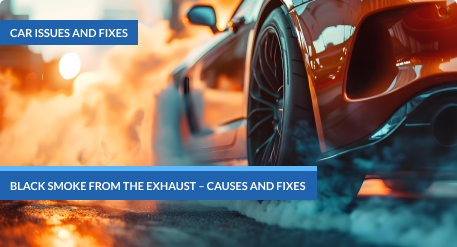In an optimum situation, when your vehicle runs smoothly, it does not release much smoke from its exhaust pipe. Your vehicle’s emission control systems are designed to manage most of the exhaust emissions. However, if you notice black smoke from the exhaust, it means that there is a problem that needs to be addressed.
There are many possible explanations for why there is black smoke blowing from your exhaust. Let’s discuss the different aspects of black smoke emission in detail.
Why is Black Smoke Coming From My Exhaust?
An improper air-to-fuel ratio might result in black smoke production. Sensors typically manage the mixture of air and fuel, providing information that fuel injectors and intake valves use to create the ideal combustion environment.
If one part of the system is broken or faulty, it can cause too much air in the combustion chamber, making your car run lean. Symptoms showing that your vehicle is running lean include
- Loss of power
- Stalling
- Check engine light
- Difficulty in starting the engine
Similarly, if the fuel system component is faulty, it can produce too much oil, a situation called running rich. In a running rich situation, along with black smoke, you may also notice
- Engine performance issues
- Sooty spark plugs
- Unusual idling
- Low fuel efficiency
Causes of Black Smoke From the Exhaust
It does not matter if black smoke comes out of your exhaust when idling or accelerating; there can be the same causes behind its emission. Here are some reasons why your exhaust may emit black smoke.
Leaking Fuel Injector
You can find fuel injectors at the head of the engine block. Through them, the fuel flows directly into the cylinder head. However, if any of the injectors start to leak, you can end up with a lot of oil in the cylinder, resulting in black smoke.
Damaged Piston Rings
The function of piston rings is to stop the engine oil from entering the combustion chamber. The rings apply the correct pressure to the cylinder wall to ensure the coating of a thin film of grease on the surface.
Damage to the piston rings allows the oil to enter the combustion chamber. So, burning engine oil and fuel can produce thick black smoke. You can diagnose if the piston rings are damaged by doing the exhaust diagnostic test.
Damaged Oxygen Sensor
The role of the oxygen sensor is to regulate the air-fuel ratio. It does that by sending information to the engine control unit or ECU about how much-unburned oxygen is present in the combustion chamber. It lets the ECU know if the engine is running rich or lean.
A faulty sensor cannot perform its job properly, resulting in your vehicle burning much more oil than required. When there isn’t enough oxygen supply, it can lead to incomplete combustion, causing an outpouring of black smoke from the exhaust.
Dirty Air Filters
Dirty or clogged air filters do not allow the correct amount of air to enter the combustion chamber. When less air reaches the chamber, it causes a higher concentration of fuel to burn, producing a large amount of black smoke.
If the cause behind the black smoke from the exhaust is dirty air filters, you will have to replace them. Replacing air filters after every 15,000 to 30,000 miles is a good practice.
Engine Deposits
A combustion engine allows fuel pressure, heat, and oxygen to form carbon deposits. These deposits can affect the engine’s performance by building up and making their way into vital components such as fuel injectors. You can protect the engine from damage and clean it using fuel additives.
Defective MAF Sensor
The role of the MAF sensor is to measure the air entering the combustion chamber. A dirty MAF can command the ECU to add excessive fuel into the chamber, creating black smoke.
Ways to Get Rid of the Black Smoke from Exhaust Pipe
If you observe black smoke coming out of your exhaust pipe, here is what you can do to fix the issue.
Clean the Air System
In the internal combustion process, the correct amount of air is required to burn the fuel completely. Not receiving enough air will cause the fuel to burn, leading to black smoke from the exhaust.
The fuel needs to burn properly so it only releases water and carbon dioxide. Using the correct combination of air and fuel is important to prevent black smoke. Check your air cleaner system to see it is dirty or clogged, as it can prevent air from coming inside. If the air cleaning filter is clogged, you must clean or replace it.
Use Fuel Additives
The debris and deposits from the combustion chamber will gradually build up in the cylinder chamber. This build-up can affect the fuel economy and reduce the engine’s performance, leading to the emission of black smoke from the exhaust pipe. The good thing is that you can get rid of these harmful deposits by mixing the diesel fuel with a detergent additive. The black smoke will also disappear within a few days of doing this.
Rail Fuel Injection System
Black smoke is quite common in new diesel-powered vehicles. Therefore, recent diesel-powered vehicles have a rail fuel injector system, which, in simple words, is a high-pressure injection that provides fuel directly to the solenoid valves.
Through the high-tech injection system, you will not see black smoke coming from the exhaust. So, if you are purchasing a diesel vehicle, choose the one with a common rail fuel injector. This way, you will not have to worry about black smoke from the exhaust.
Examine Engine Rings
When accelerating, a damaged piston ring can cause black smoke from the exhaust. As a result, it is better to inspect and replace them as needed to eliminate black smoke. Also, ensure regular maintenance of your vehicle, and if you are driving for a long time, give your vehicle some rest.
Conclusion
Black smoke from the exhaust is not something that should be taken lightly. In this article, we dived deep into the various causes of black smoke from the exhaust and how you can fix this issue. Hence, be cautious if you ever come across such a problem and don’t hesitate to reach out to a professional to resolve the issue.




